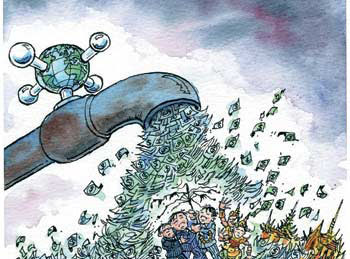 Wow – We expected an up move in the FXI but this is incredible!
Wow – We expected an up move in the FXI but this is incredible!
The Chinese government rolled out a massive $586Bn stimulus package that amounts to roughly 16% of China’s entire GDP – that would be like the US dropping a $2Tn check on the economy (which is actually the exact amount I recommended for Obama’s New New Deal package so maybe they are onto something). The plan includes spending in housing, infrastructure, agriculture, health care and social welfare, and features a tax deduction for capital spending by companies. That’s right conservatives – capital spending tax cuts are now communist!
This is an exciting start to this weeks G20 meeting on Saturday as the 20 largest economies of the World converge on Washington to discuss ways to turn the global economy. Actually, to tell you truth, they only seem to know one way and, if China’s action today is any indication, we can expect Trillions of bailout dollars to rain down on the global economy. The image on the left is the same image I used on Thursday morning when the BOE turned on the money faucet with their 1.5% rate cut, sending us into bullish energy and commodity plays that should follow through nicely this week as the G20 seems perfectly content to inflate their way out of this crisis.
 China’s financial system remains largely unscathed by the global credit squeeze, but prospects for the country’s continued rapid growth have quickly deteriorated. Export orders from the U.S., Europe and Japan are weakening, causing factories around China to trim work forces or shut down entirely — leading to unemployment that could undermine popular backing for the government. "China’s leaders realize this is really about sentiment and confidence, which needs a very fast and strong policy response," said Wang Qing, an economist with Morgan Stanley. Beijing has long used infrastructure investment to stimulate growth. In recent years, spending on everything from public works to housing to factory equipment has accounted for about four to six percentage points of China’s 10% average annual growth rate. Spending on infrastructure such as highways, ports and power plants amounted to more than $400 billion last year, on the heels of $42 billion Beijing spent preparing for the Summer Olympics.
China’s financial system remains largely unscathed by the global credit squeeze, but prospects for the country’s continued rapid growth have quickly deteriorated. Export orders from the U.S., Europe and Japan are weakening, causing factories around China to trim work forces or shut down entirely — leading to unemployment that could undermine popular backing for the government. "China’s leaders realize this is really about sentiment and confidence, which needs a very fast and strong policy response," said Wang Qing, an economist with Morgan Stanley. Beijing has long used infrastructure investment to stimulate growth. In recent years, spending on everything from public works to housing to factory equipment has accounted for about four to six percentage points of China’s 10% average annual growth rate. Spending on infrastructure such as highways, ports and power plants amounted to more than $400 billion last year, on the heels of $42 billion Beijing spent preparing for the Summer Olympics.
Needless to say, the Shanghai went flying on the news, rising 7.5% on the day, finishing back at 192. The Hang Seng added 3.5% to Friday’s gain but took a rejection at 15,000, the same mark it couldn’t hold last week. The Nikkei jumped 5.8% and settled just above the 9,000 mark, also not all that impressive as they were there most of last week. As with last week’s European infusion of capital, the markets are very skeptical: "The rebound may be a one-off because a long time is needed to turn the massive investment into real corporate earnings growth," said Qian Qimin, an analyst at Shenyin & Wanguo Securities. In Seoul, enthusiasm over China’s stimulus plan was tempered by ratings firm Fitch’s move to shift its outlook on South Korea to negative from stable, as the firm took a look at several emerging markets around the world.
Fitch had a very busy morning, lowering South Africa to negative, cutting Bulgaria and Kazakhstan to BBB- while Romania and Hungary fell to BB+. Additionally, Fitch put Mexico, Russia, South Africa, Chile and Malaysia on negative watch, indicating a likely downgrade is in the future for those countries. South Africa faces a major crisis as the current account deficit is 7% of the GDP and must be funded at very high rates. “The magnitude of South Africa’s current deficit will be difficult to sustain going forward in an environment where virtual portfolio inflows are drying up,” said Brian Coulton, a credit analyst at Fitch. “That increases the chances of a hard landing for the economy next year.”
 By the way – have I mentioned that I like gold lately? I do!
By the way – have I mentioned that I like gold lately? I do!
Over in Europe, HBC (Europe’s largest bank) wrote off $4.9Bn of bad US sub-prime loans, $700M more than they wrote off last quarter but that did not stop them from predicting a profit that will be higher than last year’s Q3. "Asia remained at the heart of core operating profitability of the group in the quarter," the bank said in a regulatory statement. "As the market deteriorates in the U.S. and Europe, we will be affected to the extent that our customers are affected." Ahead of the US open, European markets are up about 2.5% and we’ll be watching our Big Chart levels closely to see if we are can hold our progress in those markets.
The futures are very bright for the US markets but they often are on Manic Mondays so we take it with a huge grain of salt until we see our levels taken and held. The government upped their aid to AIG to $150Bn as the insurer reports a $24.5Bn loss for Q3 – that’s going to make it seem kind of hard to say no to GM, whose price target was just lowered to zero by DB, matching my prediction of last week. Meanwhile C, who are flush with their own bailout money, are not lending it to consumers but are reported to be on the prowl to buy another bank, according to the WSJ.
There is a lot of evidence of decoupling in the global markets, despite the slowdown in the major markets, the BRIC countries are still generally growing, albeit slower than was projected. Peter Schiff has an interesting take on this: "Everyone thinks the U.S. is the engine, but it’s the caboose just being pulled along. China and the others are healthy economies that foolishly loaned us their surplus capital that we squandered. But that doesn’t reflect on the local economies. They’re still intact. The factories are still there, the work ethic is still there, and they’re not entirely dependent on the U.S. for their own growth."
 By and large America’s economic margin is shrinking, which means the U.S. becomes a smaller player in the global economy over time. A retrenching U.S. consumer "is totally irrelevant to China’s investments in clean water, improved agriculture and better infrastructure," said Jim Rogers, a former hedge-fund manager turned global investor. "That’s the essence of decoupling," said Bob Andres, chief investment strategist at Virtual Portfolio Management Consultants. "That’s not saying the U.S. is losing economic power, only that the demise of the reliance on the U.S. is clearly a trend. And it’s healthy."
By and large America’s economic margin is shrinking, which means the U.S. becomes a smaller player in the global economy over time. A retrenching U.S. consumer "is totally irrelevant to China’s investments in clean water, improved agriculture and better infrastructure," said Jim Rogers, a former hedge-fund manager turned global investor. "That’s the essence of decoupling," said Bob Andres, chief investment strategist at Virtual Portfolio Management Consultants. "That’s not saying the U.S. is losing economic power, only that the demise of the reliance on the U.S. is clearly a trend. And it’s healthy."
Let’s hope the rest of the World can keep it together for us because it’s going to take 4 Trillion Dollars, not Yuan to get this economy back on track and clearly, the rest of the World is busy with their own problems and won’t be there to bail us out. Obviously we’re going to get a boost but, if we don’t take last week’s highs of Dow 9,600, S&P 1,000, NYSE 6,300 and Nasdaq 1,775, then we’ll be taking the covers off our longer puts and riding the market back down as we seek to establish a proper floor on this market.


